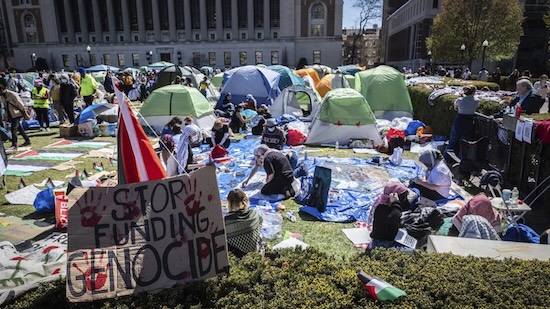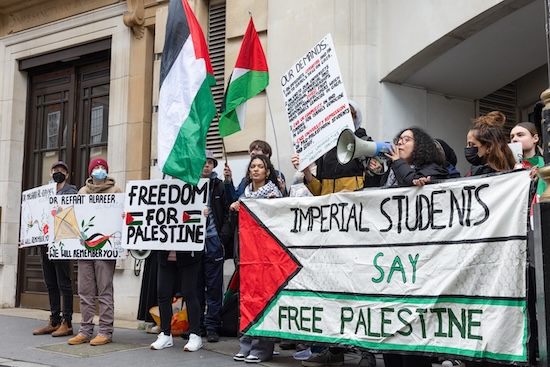
c/o The Hill
If you’re an international student at an American college or university who plans to participate in a political protest this year, reconsider. This precaution is not to monger fear, or to promote silence, or even to reinforce bystanderism. As a fellow international studying at an American university with a politically active student body, I believe we must review our standing, resources, and precarious status. More specifically, if one studies at a liberal arts university where political protests such as the pro-Palestine encampments have occurred and been met with repressive police presence, one must consider what the past year’s election results bring with them for international students.
The extreme right-wing policies that will loom over the country for many of our college careers are a larger threat to international students of color than they are to students with citizenship. Most international students study at American universities on F-1 or J-1 student visas, which are subject to review and can be canceled if the student has questionable academic or legal standing. In January, President Trump signed Executive Order 14188 titled “Additional Measures to Combat Antisemitism,” which urges universities to “monitor” international students for criminal activity, relating specifically to pro-Palestine protests.
“Come 2025, we will find you, and we will deport you,” read a White House fact sheet about Trump’s executive order.
Beyond protests for the liberation of Palestine or university divestment, international students have cultural and national reasons for demonstrating. For example, Wesleyan’s Russian, East European, and Eurasian Studies Department is facilitating student-organized events for the three-year anniversary of Russia’s invasion of Ukraine, which will be attended by many international students. Even in private institutions such as Wesleyan, federal policies impact international students’ activist discourse, largely because of potential legal consequences for engaging in activism on campus.
An international student’s violation of the academic code of conduct may precipitate suspension, which would then constitute a violation of visa status. A recent example of this issue during former President Biden’s administration was the suspension and threatened deportation of international graduate student Momodou Taal (originally from the United Kingdom) from Cornell University in 2024. After his participation in a pro-Palestinian protest during a career fair, Taal was suspended and unenrolled from Cornell, and subsequently faced deportation charges on basis of the violation of his visa status. Although Taal is not facing deportation anymore, and is now only banned from campus, the new administration may not be as forgiving. Trump is vowing to deport international students for simply protesting.
This comes despite Trump’s statement on a podcast in June 2024 that foreign students studying in America should receive green cards upon graduation. Despite this, there is much precedent for our persecution (as seen in Taal’s case), and no policy framework for our protection (Trump’s promise was soon rolled back by his spokesperson).
Immigration experts aren’t persuaded either.
“I almost have to laugh because [Trump’s first-term] administration adopted multiple policies aiming to restrict student visas and make it harder for people to stay in the country after graduating,” said Aaron Reichlin-Melnick, a senior fellow at the American Immigration Council, in a Reuters article.

c/o Oregon Public Broadcasting
Admittedly, there are two valuable counterarguments. First is that cases like Taal’s may be unique and don’t represent a national pattern. Second is that international students are aware of America’s political climate and their universities’ policies, and study here willingly. Consequences of breaching said policies should not come as a surprise, nor should they be labeled discriminatory or persecutory.
While I concede that cases like Taal’s are unique, the restrictions faced by internationals under Trump’s first presidential term weren’t. The Trump administration initiated a 90-day travel ban in 2017 for foreigners from Muslim countries and introduced a plethora of policy reviews for their stay duration, while attempting to eliminate Optional Practical Training, a program that allows international students to work in the U.S. post-graduation. Moreover, while international students enjoy protection under American law in return for acknowledging their university’s policies, they also enjoy student culture and student rights—one such right has historically been the freedom to peacefully protest. Accepting national and educational sovereignty does not exclude an international from the universal right to peaceful assembly and freedom of expression.
Students must, in this context, rethink what activism means for them. At this point, it might be smarter and safer to create change in the background, while reducing physical protest in the foreground. Risking one’s educational status for ideals is an admirable showcase of conviction, but comes with danger. Finishing one’s education, accessing resources in the longer term, advocating strategically, and protecting our stay here is the path that now may provide more scope for impactful activism—as opposed to getting arrested the day of your first on-campus protest.
We should stay here long enough to invoke meaningful change. Our officials, our political landscape, and our legal realities are changing. Our activism shouldn’t shirk, but rather transform to meet this.
Voicing dissent and impressing change is still possible, as it must be. Writing for on-campus publications, engaging with international student forums and bodies like Wesleyan International Speakers Program and the International Student Advisory Board, continuing conversations with family back home and diaspora in America, forming connections with faculty, organizing civic engagement workshops, and building relationships with community organizations are only some of the ways to ensure one’s activism reaches beyond the ivory tower while sustaining one’s ability to act over time. Keeping in touch with educational immigration officials and the University’s Office of International Student Affairs is also key for being updated about new policies and regulations.
It may be tempting to throw in the towel, and the books, and your Wes merch-turned-souvenir, and then book a one-way flight home. The international student presence on campus brings great assets to the political culture of any institution that welcomes it, and we must remember that. There are still ways to spur change in America safely under the new administration’s dangerous policies, and it is important that we seek out these methods to ensure our voices can remain heard.
Janhavi Munde is a member of the class of 2027 and can be reached at jmunde@wesleyan.edu.